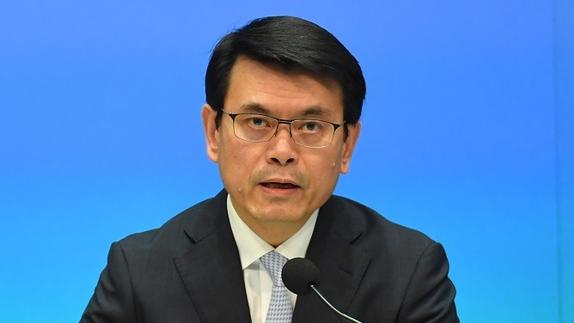 In this file photo, Secretary for Commerce and Economic Development Edward Yau Tang-wah elaborates on initiatives relating to the Commerce and Economic Development Bureau in the Chief Executive's 2018 Policy Address at a press conference in Hong Kong, Oct 11, 2018. (PHOTO/CEDB.GOV.HK)
In this file photo, Secretary for Commerce and Economic Development Edward Yau Tang-wah elaborates on initiatives relating to the Commerce and Economic Development Bureau in the Chief Executive's 2018 Policy Address at a press conference in Hong Kong, Oct 11, 2018. (PHOTO/CEDB.GOV.HK)
HONG KONG - Secretary for Commerce and Economic Development Edward Yau Tang-wah on Monday said the signing of the Regional Comprehensive Economic Partnership (RCEP) is an important milestone for economic integration in the region and sends a strong and clear message for an open, inclusive and rules-based trade and investment arrangement.
Hong Kong is keenly interested in joining the RCEP and stands ready to start dialogues on accession with its member economies when the time is ripe for the RCEP to take on new partners, Yau said at the Asia-Pacific Economic Cooperation (APEC) Ministerial Meeting on Monday night.
Hong Kong is keenly interested in joining the RCEP and stands ready to start dialogues on accession with its member economies when the time is ripe for the RCEP to take on new partners, Secretary for Commerce and Economic Development Edward Yau Tang-wah said
He noted that the special administrative region already had the high-standard Free Trade Agreements with the Association of Southeast Asian Nations, Australia and New Zealand and the Mainland and Hong Kong Closer Economic Partnership Arrangement.
At the virtual ministerial meeting, participants shared their views on various key issues related to global trade and regional economic integration, including support for the multilateral trading system (MTS) and the World Trade Organization (WTO), responses to the COVID-19 pandemic and economic recovery, and efforts to promote the development of the digital economy.
ALSO READ: RCEP pact 'victory of multilateralism, free trade'
Speaking at the session on improving the narrative of trade and investment, Yau said that the economic turmoil brought about by the COVID-19 pandemic and the steep increase in the number of protectionist measures recently had dampened global trade flows and investment sentiment, weakening the collective strength in withstanding the current economic recession.
He called on member economies to redouble their efforts to contain the escalating trade conflicts through engagement and constructive dialogues.
Yau also highlighted the importance of the rules-based MTS amid the pandemic, with the WTO as its core, in maintaining stability for international trade and bringing back economic growth.
He said one of the most urgent tasks is to restore a fully functioning MTS through constructively helping the WTO to reform and improve but without grinding its functions to a halt.
Hong Kong is committed to engaging in constructive dialogue with all APEC member economies in supporting the WTO as the city has always done throughout the years, Yau said.
ALSO READ: International trade to get RCEP boost
He said that APEC member economies should work together to chart the path to post-pandemic recovery in the region.
Yau cited the establishment of the Air Travel Bubble between Hong Kong and Singapore as an example, pointing out that the arrangement could help resume cross-border people-to-people flow between the two places in a safe and progressive manner.
He said that Hong Kong would continue its dialogue with other APEC member economies with a view to expanding with full health precautions, its air travel bubble network across the region.
He added that doing so would open up a lot of business opportunities in public health, testing and services in support of the new form of trading in the post-pandemic era.
READ MORE: RCEP 'a driving force for global economy' in post-virus era
Yau will also address the session on inclusivity, the digital economy and innovative sustainability. Hong Kong has been championing the use of online dispute resolution in fostering the participation of micro, small and medium-sized enterprises in international trade, which can help resolve cross-border business-to-business disputes, especially when face-to-face contacts are disrupted during the pandemic.


